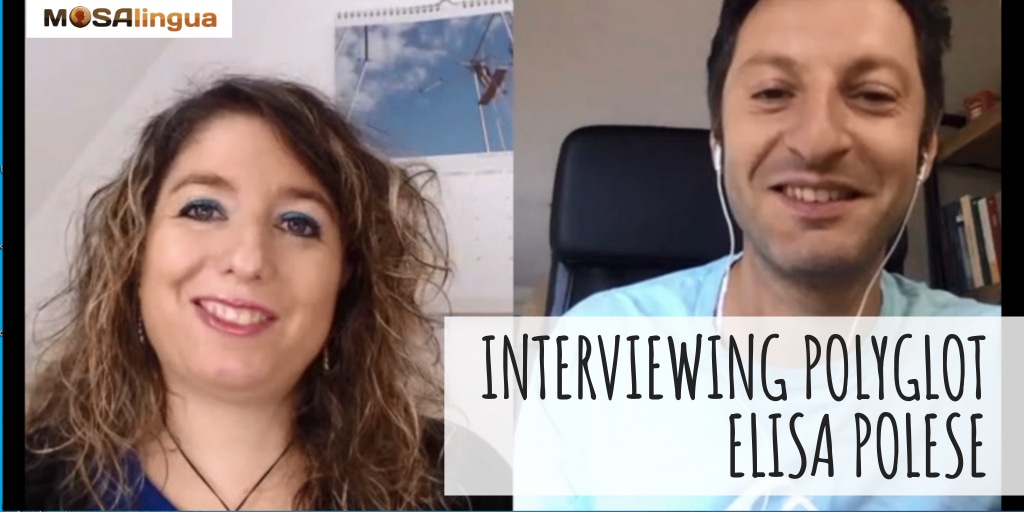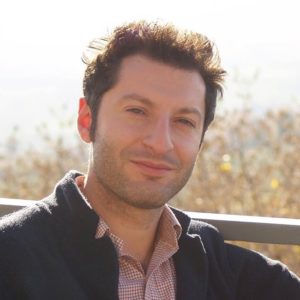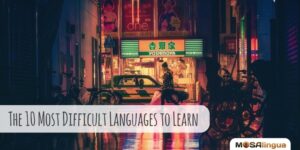Hyperpolyglot Elisa Polese from Speak From Day One with Elisa spoke to Luca, the co-founder of MosaLingua, about her personal method for learning foreign languages. This Italian polyglot has learned 25 languages—and she fluently speaks and teaches 13 of them. Watch the extended interview or read the highlights to learn all her hyperpolyglot secrets!

Interview: How Language Lover and Hyperpolyglot Elisa Polese Approaches Learning Foreign Languages
Watch Luca’s interview with Elisa right here or on our YouTube channel. If you’re in a hurry, scroll down to read the highlights. Don’t forget to come back to watch the full video later.
To watch more polyglot interviews and get other language learning tips and tricks, subscribe to the MosaLingua YouTube channel
Highlights from Luca’s Interview with Elisa Polese on Her Secrets to Learning 25 Languages
“I define myself as a language lover above all because this is where everything started. Then I learned many languages. Still for my passion, not because I wanted to do something particular but because I like it very much. Then I transformed it into my job. And so I’m so grateful that I actually do what I love.” —Elisa Polese
About Elisa Polese
Elisa: I’ve studied 25 languages, and I teach 13 of them. I learned the other languages because I’m fascinated by the way languages work. Above all because behind languages, there are mentalities, ways of thinking, cultures.
As far as my background is concerned, I decided that I wanted to study languages when I was eight, only because I went to Paris and I fell in love with French. But I didn’t know how to learn languages, so I was very bad at learning languages until I was 14-16. I really understood how to learn languages only later, when I went to university. First I studied translation and interpreting, and then I studied to be a teacher. I have a Master’s in didactics, and a certificate from Cambridge University, the CELTA, to teach English.
Luca: So, we both come from Naples in Italy. You’re Italian—were all these studies in Italy or in another country? Half and half? Did you only study in Italy, or also in other parts of the world?
Elisa: I have itchy feet; I don’t like to be always in the same place, and I wanted to study what I really loved. So I started in Naples, but I must say I wasn’t very happy with the level of the education. Above all the organization—not really the level, but the way, which was very traditional, and also the organization, which was close to zero. I studied in Bologna, at the interpreting school of the University of Bologna. I love studying, so I also have a Master’s from the University of Modena, which is also in the north of Italy, in Communications and International Organizations. And during my studies, I spent one year in the UK, I spent some time in Switzerland on an exchange program, and I also spent some time in Germany.
What are the first things hyperpolyglot Elisa Polese does when she starts learning a new language?
Luca: You have a lot of experience with teaching and learning languages. I’d like to know, what are your very first steps when you start learning a language? Because we have different approaches—we’re all different. I know some people can start with one aspect of the language, others with other skills… so what are your first steps?
Elisa: First, I look for material which I enjoy, that I know is useful, and is above all reliable. Because of course, I don’t want to learn something which is wrong. But the most difficult part, I think, is to find something which I enjoy. Because now after studying many languages, I know what works for me. But also for anyone else (more or less), and I know that I don’t want the traditional book. I really want something that makes me speak from the very beginning, so the first thing is finding something I can rely on and I can study with every day. I don’t want to study for hours on end—I don’t have the time. But I do think it’s possible, if you have the right material, to study and see results. So it’s one: what you study, and second: the method.
And then the other two things I do—I listen a lot to the language because otherwise, I wouldn’t be able to understand people, and I listen to the language even though I don’t understand anything at the beginning. Because our brain has to adjust to it, we have to understand when a word starts and when a word ends, so this is very important to me. This is my way to learn vocabulary or revise vocabulary because important words always come up.
But again, you have to choose the material carefully, because for example, if I love talking to people, what I focus on at the beginning are dialogues or something that I can use in conversation. Maybe if you love cooking, then start listening to things about cooking. So at least you will have the vocabulary that you will need when you want to speak. Your interests should also be a part which helps you choose the material you want to study.
Then the last thing is speaking. The third thing that I really do when I want to learn a language is to start speaking it as soon as possible. In my case, as my motivation is speaking, if I were to study a language for one year and then start speaking, I would have lost my motivation a long time before. This is why it’s very important for me to organize things in a way that I can speak as soon as possible.
Does “speak from day one” really mean speak from day one?
Luca: This was one of my next questions, you know, because you have a website called Speak From Day One with Elisa, of course, “day one” is a way to say “speak early” or “speak as soon as possible.” People can say you’re smarter because you have a lot of experience with languages, they can say many things. “Elisa can do that because she has a lot of experience, she teaches languages…” But how can a normal person who’s struggling with language learning possibly start speaking so quickly? What are your tips to speak as soon as possible?
Elisa: I must admit that I really mean from day one, so I don’t mean in one week. I mean from day one. Of course, what I can say on day one is not the same that I will be able to say on day ten. But I can start speaking.
How does hyperpolyglot Elisa Polese help her students succeed?
Luca: I know you’re a language teacher and a language coach. You’ve learned many languages, and you help people master languages. So I’d like to know if you’ve identified the keys to learn a language quicker, faster, or better. How, for example, do your students succeed, and how do you help them? What are one or two things you do that make the difference or change the game in your opinion?
Elisa: In my opinion, the most important part is to focus on the right things, but with the right method that fits you. Because there’s no such thing as a method that fits everyone. If you don’t really want to speak and you really want to read, there are methods to help you learn the language without speaking. I mean, everyone is different, so whatever motivates you. The main factor is to not spend lots of time on something which isn’t helpful to you and that doesn’t serve your highest priority, your highest goal. What is your highest goal? Speaking? Then you have to concentrate and focus on those activities which help you speak. And they’re not only speaking, of course. You can’t say, “I want to speak” and then not speak. Because otherwise, it’s like wanting to drive without trying yourself.
But there are other activities: language structures, vocabulary, and lots of listening. There are certain strategies that still help you reach your goal in a faster way than other things. Focus on the right things and on the right material. A list can be very useful if it contains words that are really good for you. And the list can be very useless if contains words that are too difficult for your level.
So focus on the right things, and use a method that suits you. For example, let’s talk about something specific—European languages. Everyone needs to know verbs. There’s no way around that. At least some verb conjugations, some tenses. You don’t need to do everything, but you do need to know how to express the future and how to express the past if you want to have a conversation. So having said that, learning verbs can be done in different ways. If you’re a person who loves grammar and you want to learn from A to Z, okay. But there are many people who aren’t like that. So you can learn verbs in a way that’s much more practical: looking for patterns and applying the patterns to conversations that are useful to you.
The other thing which is very important is to treat yourself kindly. Maybe you’re someone who is very self-confident, but according to the experience I have, most adults say, “I can’t learn this language. It’s very difficult pronunciation, it’s very difficult.” Or when they can’t remember one word, “Ah, I should have known it. Why can’t I remember it!” And I understand because I was in the same situation many years ago when I started learning German.
Polyglot “secrets”
Luca: You said a lot of very interesting things, just to react to the last one which is very important. We both go to polyglot gatherings and conferences, so with some polyglots, we’re friends and we speak a lot. And you know, people are always asking for the secrets, because—well some of them are really brilliant, even in terms of pronunciation I really admire them. They’re doing a great job. But when you speak with them, you realize that languages are part of their life, and they spend—or they have spent—a lot of hours learning languages. And I think if there is a secret, it’s that they study a lot. They expose themselves a lot to the language, and languages are part of their life. So as you said, consistency, regularity, and the fact of exposing yourself a lot to the language you want to learn is really important.
Elisa: What you said was very interesting. I would like to add a couple of ideas—the first thing is about pronunciation. It’s true that some people have very nice pronunciation, but I also would like to highlight that it’s a matter of priority. For example, my pronunciation in French is much better because I really wanted to have perfect pronunciation in French. It’s happened to me many times that people ask me, “Are you French?” So I think it’s also a matter of priority.
I don’t think pronunciation is priority number one for me. For me, it’s very important in the sense that if I knew that I’m speaking now and you couldn’t understand me, it would be very important to me to improve that. But for me, the important part is not the perfect pronunciation. For me, it’s perfect communication. When I go somewhere either for work or for fun when I talk to people, I don’t judge people because of the way they pronounce things. And if I knew that they were doing that with me, I wouldn’t want them to be my friends. Even for work, you see so many very effective chief executives who aren’t native speakers, but they can still work in a very proficient way. Sometimes it’s more important to be proficient in the language in the sense that you can use it to do everything you want.
You just have to decide that pronunciation is your priority. I just want to reassure everyone that improved pronunciation is possible. It takes effort, like any other thing, so if it’s your priority you can do it. The other thing I wanted to say is what you said about having languages being a part of your life. Of course, it helps immensely. I’ve lived in different countries: I lived in Germany, in France, in Spain, in Russia, and it always helped. But what I wanted to say is once more reassure… not everyone wants to speak a language at level C2. Sometimes people want to be able to enjoy conversations with friends, go on holiday, have conversations, feel a part of it, but they don’t need to understand every single word.
The most important thing is exposure. At the very beginning, exposure is very important so you can progress very fast and understand much faster, but how fast you want to go depends on you.
Is hyperpolyglot Elisa Polese a list person?
Luca: You mentioned lists, you know vocabulary lists, and so on. Maybe you prepare all the vocabulary you need, or maybe you have a job interview and you prepare all the words and sentences you need in that specific situation. But I remember when I was learning ancient Greek at school. I went to what in Italy they call the liceo classico, like the literary side of high school, and I was learning lists with completely useless words and without any organization criterium. So it was just, you know, a memorization effort, but in my opinion, it was completely stupid.
On the other hand, I really agree with what you’re saying, that you have to be goal-oriented. And in terms of lists, I really like frequency lists. The words that are more common and that you can stumble upon more frequently when you learn a language.
Elisa: Now that you’ve mentioned lists, I can say that I have mixed feelings about lists. I think they can be very useful, but they must be really focused on what you want to learn. For example, since I studied linguistics, I know what frequency lists are. In order to have a frequency list, you have to have a corpus. A corpus is a number of terms coming from a specific source. So normally, in order to have a frequency list, you have to decide what your corpus is. For example, all the newspapers published in the country at that time. So it’s not random things. Frequency lists are very good, but only if they have a good corpus behind them. Because if the corpus is the news, I’m sorry, it’s level B2-C1. So I don’t need that frequency list.
Once I worked on that; I looked for frequency lists online, and the ones I could find were with words I wouldn’t ever teach at an A1, A2, B1 level. It really depends where the list comes from. If, for example, you talk about a list made of words—like probably you know what words are used very much at the A1-A2 level—so if you make a list according to that, to your experience, and a specific context… As I told you before, my aim is to talk to people, so what do I talk about? I talk about what I’m going to do next weekend, what I did last weekend, and I want to know the same about the other person. I want to know about their hobbies, about their work, so now the context is not as broad as before, and specific words regarding these topics are very good.
There is active vocabulary and passive vocabulary. Let’s say that I want to talk to random people. By random people, I mean I don’t know what they like in advance. So I don’t need to know all the sports. If in lesson A1, I learned twenty sports for Sinhalese from Sri Lanka, I still can’t talk. But if I want, I can learn it as passive vocabulary so when I talk to people, they can tell me what they like. This is different; I don’t want to put all my effort into learning things I can’t use myself, but I want to put effort into passive vocabulary.
How to build your learning ecosystem
Luca: I agree with you that a tool can be—and we even spoke about it on another occasion—the fact that an app, for example, can be part of an ecosystem where you learn from different methods.
For example at MosaLingua we have a mobile app teaching vocabulary. We give a lot of tips inside the app, but we never promise “you’re going to speak the language only using this app.” At some point, we say, “Okay, now you know 300 words, 600 words maybe, it’s time to speak with a language tutor or a language partner to try to put into practice what you’re learning.” And then you can use podcasts and listening materials because there are different skills. Sometimes an app, or maybe even a course, is very good at helping you develop a specific skill, but it’s very hard to find something able to cover everything.
Elisa: I couldn’t agree more, and I really like what you said about your app. This is really what I think could be a good complement, a good addition to other methods or channels. I call them channels because a language, as you said, is an ecosystem. Everything works, but you can focus on certain things to make it work faster and better.
And at the same time, it’s a combination of different factors. I can speak a language and I can focus on speaking, but I can’t completely ignore listening. For reading, it depends where you live and which language we’re talking about, but still, I need to understand some signs, some SMS [messages], so it really depends on the language and the context. But I really like the idea that you can decide, “I really want to learn that word, or I really don’t want to learn that word.” This is much better than what I’ve seen in other apps where you can’t go ahead if you don’t learn a word. This is why in my courses I concentrate on vocabulary that everyone needs.
Follow Elisa to learn more
Luca: Elisa, thank you very much! You said a lot of very interesting things, and we could speak for hours. But I don’t want to take more of your time, so the last question is: where can people find you?
Elisa: If you want to find more about me, you can go to my website speakfromdayonewithelisa.com. You can also go to my YouTube channels, which are Smart German for Busy People, Smart Italian for Busy People, or Passion for Languages. I’m also on Instagram with the same names: Speak From Day One with Elisa, Smart German for Busy People, and Smart Italian for Busy People.
Related posts:
Start learning a new language today

Good news: we can help!
More good news: you can get started for free! Start your free trial now and for the next 15 days, take advantage of the most effective language learning method on the market!
Vocabulary flashcards, videos with subtitles, audiobooks, articles adapted to your level – with MosaLingua Premium (Web & Mobile), you’ll have access to all this and more. Get started right now. It’s free—and risk-free—to try!
 Elisa: I’ve studied 25 languages, and I teach 13 of them. I learned the other languages because I’m fascinated by the way languages work. Above all because behind languages, there are mentalities, ways of thinking, cultures.
Elisa: I’ve studied 25 languages, and I teach 13 of them. I learned the other languages because I’m fascinated by the way languages work. Above all because behind languages, there are mentalities, ways of thinking, cultures. Luca: So, we both come from Naples in Italy. You’re Italian—were all these studies in Italy or in another country? Half and half? Did you only study in Italy, or also in other parts of the world?
Luca: So, we both come from Naples in Italy. You’re Italian—were all these studies in Italy or in another country? Half and half? Did you only study in Italy, or also in other parts of the world?![Interview with Lydia Machova on the Biggest Language Learning Mistakes [VIDEO]](https://www.mosalingua.com/en/files/2017/08/23-300x169.jpg)



Comments